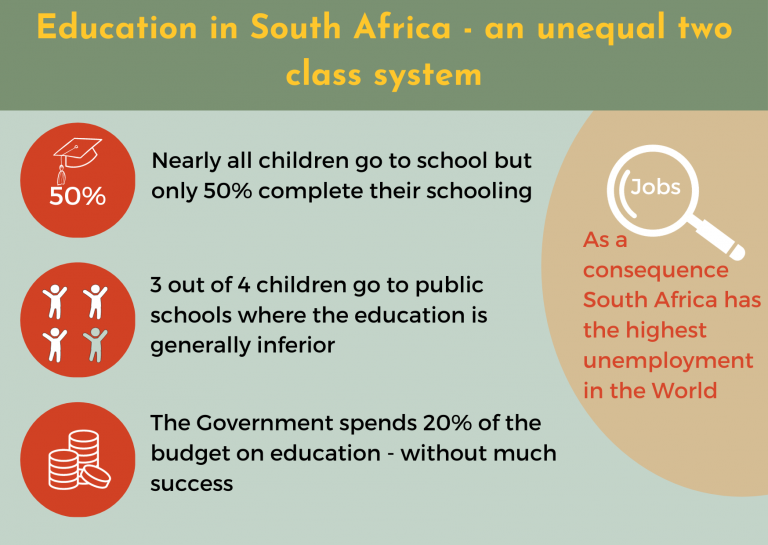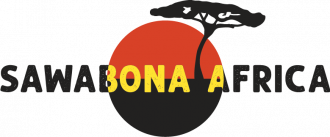South Africa's unequal fight for education
Listicle
December 2023
South Africa’s unequal fight for education
Munich, 12. December 2023 – The apartheid era is almost 30 years old. But the social differences in South Africa’s schools are still glaring and the figures on the quality of education are dramatic. The non-profit organisation Sawabona Africa has compiled the key facts.
In 1953, the Bantu Education Act was passed – a law that cemented racist ideology in South African schools. Blacks were to receive only a rudimentary education: Apart from basic reading, writing and arithmetic, the emphasis was on practical skills such as cooking, cleaning, handicrafts and gardening. The idea was to learn only what the regime deemed necessary to work as unskilled labourers. Those days are long gone – but there is still no equality in education. Sawabona Africa explains why:
- Many do not have access to a good education. The good news is that South Africa has one of the highest school enrolment rates on the continent, at almost 100 per cent. However, the majority of children, around 75 per cent, depend on public institutions. Most of these charge little or no fees and are therefore the only option for socially disadvantaged families – but they are nowhere near the level of the well-resourced educational institutions, whether private or state. The South African government’s massive funding programmes have done nothing to change this: It invests about 20 per cent of public funds in education to address inequalities, but without much success. Another problem is that there are no uniform educational standards, as each province supports its schools differently, depending on its economic viability and prosperity.
- South Africa is at the bottom of the education league table. The quality of education is disproportionate to the amount of money the state invests in the school system. Children usually start school at the age of seven and remain in primary school until grade seven. They then move on to secondary school, which ends after the twelfth grade and allows them to go to university if they pass their exams. However, due to poor learning conditions, poverty and lack of support at home, every second child drops out of school without a qualification. Reading, writing and arithmetic skills are also shockingly low by international standards: according to the PIRLS report, only 19 per cent of fourth graders can read and understand a text. Conversely, this means that 81 per cent of children are unable to cope. The situation is not much better when it comes to mathematical and scientific literacy. According to the latest TIMSS rankings, a significant proportion of South African students do not even have the basic skills required for the next level of schooling. It doesn’t help that the already low matric standards are lowered in bad years to allow more students from disadvantaged backgrounds to pass.
- Poorly equipped classrooms make learning difficult. The fact that the standard of education in South Africa is still so low is due to the disastrous learning conditions in public schools. Buildings are usually in a dilapidated state and there are still schools without electricity, water or toilets. Classrooms are also overcrowded, with up to 100 children per classroom. In many places there are no textbooks, classes are often cancelled, there are no back-up classes and homework is rare. Another problem is that the best teachers tend to work in government schools or institutions, where school fees are higher and salaries better. As a result, it is almost impossible for socially disadvantaged students to break the cycle of poor education and poor future prospects. However, numerous studies show that there is a causal link between well-funded schools and good results: in financially strong provinces, significantly more children complete their schooling and do so with significantly better grades. In other educational institutions, however, not a single student passes the matriculation exam.
- Without an education, the path to a better future is blocked. The quality of schooling has a significant impact on the future development opportunities of young people. A school-leaving qualification gives better access to the labour market. School leavers with qualifications are twice as likely to find a job as those without. A university degree even triples the chances of finding a well-paid job. However, South Africa is still a long way from achieving this: according to the World Bank, the country has the highest unemployment rate in the world. According to official statistics, the rate is 61 per cent for 15- to 24-year-olds, and 71 per cent if all economically inactive people are included. As a result, almost half of the population lives below the poverty line.
“The South African education system is an unfair two-tier system. Families who can afford it send their children to fee-paying institutions or expensive private schools. For the majority of the population, however, the costs are far too high and they can only access the generally poorly equipped public school system. As you can see, far too many children drop out of school prematurely and without any qualifications. This shatters their dreams of a better future,” says Zilla Stekhoven, founder of Sawabona Africa e.V. A graduate lawyer in South Africa, she worked internationally in many fields before founding Sawabona Africa in 2021. “We urgently need a far-reaching transformation of the school system in South Africa. This includes standardised training for all teachers, equal distribution of funding and the rapid expansion of schools with the necessary infrastructure. In the meantime, container classrooms for extra-curricular programmes are an important and quick solution to compensate for the lack of education in many areas of South Africa: After their regular lessons, the children receive tuition in writing, reading and maths

Sawabona Africa:
info@
PR-COM GmbH
Natalie Burkhart
Sendlinger-Tor-Platz 6
80336 München
Tel.: 089/59997-804
